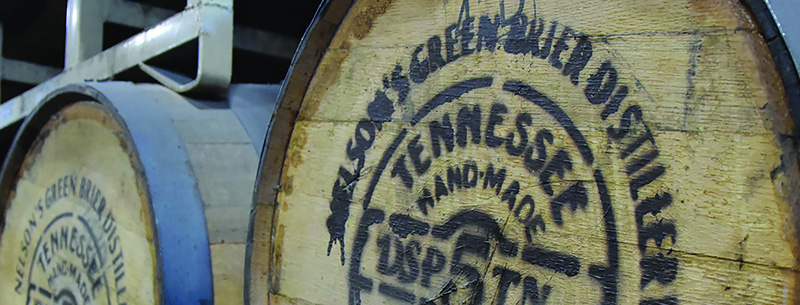Ask someone to name a Tennessee whiskey, and there’s a good chance Jack Daniel’s will be their reply. As the best-selling whiskey in the world, the brand sold 12.5 million cases last year, and their Lynchburg distillery sees over 300,000 visitors annually.
But for whiskey aficionados, the Volunteer State has much more to offer than just Jack. The Tennessee Whiskey Trail, which officially launched last June, maps out 25 stops from among the state’s 30-plus distilleries.
We’ve put together a “whiskey weekend” that included stops at Nelson’s Green Brier Distillery and Corsair Distillery in Nashville, George Dickel Distillery outside Tullahoma, and returned home to Chattanooga Whiskey’s Experimental Distillery on Market Street.
Nelson’s Green Brier Distillery
1414 Clinton St., Nashville, greenbrierdistillery.com
Tours seven days a week, $11 per person
A giant copper still is the centerpiece of the production floor at Nelson’s GreenBier Distillery in Nashville.
“Bourbon is America’s official spirit,” noted tour guide, Jim Cain, citing the 1964 Congressional resolution sponsored by Senator Jim Bunning. While Bunning was from Kentucky, the honor is extended to all American whiskeys, including those produced in Tennessee, and it is something in which distillers take great pride.
Cain is a masterful storyteller with a good yarn to spin. A few years prior to the Civil War, German-born Charles Nelson moved to Nashville to open a grocery store focused on three best-selling products: coffee, meat, and whiskey. Liquor sales began to outpace the other two products, leading Nelson to purchase the distillery that was producing his spirits. In 1885 he sold nearly 380,000 gallons of Nelson’s Green Brier Tennessee Whiskey, outpacing Jack Daniel’s sales sixteen to one.
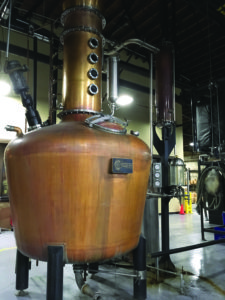
Nelson’s wife, Louisa, took over the business when her husband met his untimely death in 1891, successfully running the company until Prohibition forced her to close in 1909. One hundred years later, Nelson’s great-great-great-grandson revived the brand, beginning with the award-winning Belle Meade Bourbon, known for its high rye content and longstanding ties to the Kentucky Derby.
The current Nelson’s distillery in downtown Nashville opened in 2014, and tours include historical memorabilia, the production, and aging facilities, and a tasting. Ours featured Nelson’s Green Brier 108 Limited Release Tennessee Whiskey, which is sold in hand-numbered bottles, along with Belle Meade Straight, Sherry–and Madeira-Aged Bourbons.
Corsair Distillery
Corsair Distillery Headquarters, 601 Merritt Ave., Nashville, corsairdistillery.com
Corsair Brewstillery, 1201 Clinton St., Nashville
While Corsair Artisan Spirits have its distillery headquarters in Nashville’s Wedgewood Houston neighborhood, it’s more convenient to visit the company’s Nashville “brewstillery” just down the street from Nelson’s Green Brier.
“We’re the best of both worlds for beer and whiskey lovers,” explained Corsair’s Chris Thomas, brewstillery facilities manager. Their high-gravity taproom offers beers made with alternative grains, some of which are barrel-aged, demonstrating the delicious similarities between brewing and distilling.
Perhaps best-known nationally for their artisan gin, Corsair has five whiskeys in its current product lineup, as well as a varying number in its seasonal and experimental lines. Thomas recommended the award-winning Quinoa, Tennessee Single Malt, and Triple Smoke whiskeys for our tasting. “I love the Quinoa Whiskey in a hot toddy,” he said. “The nutty flavors work really well with honey and lemon.”
Corsair’s Tennessee Single Malt is a more traditional, Scotch-style whiskey, and the Triple Smoke is a gem for lovers of complex liquors. “The malted barley is split into three parts—one smoked by cherry wood, one by peat, and one by beechwood—before they’re combined for barrel aging,” noted Thomas. “The Triple Smoke is excellent served neat.”
In addition to spirit tasting selections, the Corsair bar offers a half dozen specialty cocktails, high-gravity beers and portable snacks perfect for enjoying in their open-air courtyard.
George Dickel Distillery
1950 Cascade Hollow Rd., Tullahoma, georgedickel.com
Tours seven days a week, $10 per person
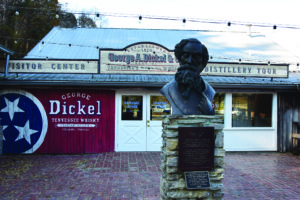
There are no surviving photos of George Dickel, who died in 1894, but there is a single etching made during his later years. That image was used to create the bronze bust that sits in front of the Cascade Hollow visitors center.
Traveling to Cascade Hollow is a bit like traveling back in time. You venture through a peaceful, small-town neighborhood near the center of Tennessee until you reach the local garage with a hand-painted mural that reads, “Turn here.”
Once you do, you pass the distillery’s original nineteenth-century property with the cold, clear spring water that makes its whiskey so famous. Whiskey, that is.
“Do you notice anything different about our name?” asked Kyle Pyrdom, our tour guide, as he pointed to the large sign above the guest entrance. “We spell it whiskey like they do in Scotland or old Ireland.” That lack of an “e” marks one of the key differences between George Dickel’s product and those of their Tennessee brethren.
Dickel preferred his whiskey made in the winter over that produced in the summer because he liked a smoother, cold-filtered taste. The company’s “Lincoln County Process” involves filtering the whiskey in chilled, 13-foot vats filled with charcoal sandwiched between two layers of virgin wool, and Pyrdom insists this makes all the difference.
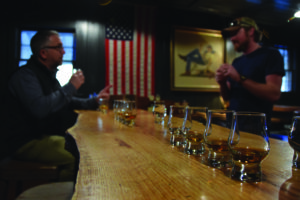
The tasting room at George Dickel’s Cascade Hollow visitors center is an intimate affair, much like the distillation process itself. The company prides itself on maintaining the same hands-on approach it has used to make whiskey since 1870: “Hand Made the Hard Way.”
“We burn ricks of hard maple into charcoal, and then we draw straws to see who collects it,” he said. Is it an honor or a rite of passage? “Not really,” he laughed. “The short straws have to shovel all of the charcoal into sacks and carry it across the road to the distillery,” he explained. “Our motto is, ‘Hand Made the Hard Way.’” In fact, everything at the Dickel distillery is still done by hand as it was in 1870, from counting barrels to weighing grain.
The distillery sits on 1,000 acres of prime land, and it acts as a good steward to the surrounding farms by providing the spent grain-free of charge for local livestock. “Some distilleries sell it to farms at a reduced cost, but we actually pay the farmers to come to take it off our hands,” Pyrdom said. “It’s made us great neighbors for generations, and we joke that beef grown in Middle Tennessee comes pre-marinated.”
Our tasting started with George Dickel White Corn Whisky No.1, which begins with the same mash recipe as the company’s No. 8, No.12 and Barrel Select whiskeys. Pyrdom said he enjoys this clear spirit in cocktails, like a whiskey Bloody Mary or Tennessee Mule. The No. 8 is the company’s most popular spirit, while the No. 12 is 90 proof with a surprisingly smooth finish. Only 10 barrels of Dickel’s vast annual production is selected for the well-balanced, small-batch Barrel Select.
Chattanooga Whiskey Experimental Distillery
1439 Market St., Chattanooga, chattanoogawhiskey.com
Tours seven days a week, $12 per person
Don’t think that new whiskey in Chattanooga is short on great old stories. For a time, downtown’s Market Street was known as “Whiskey Way” and was home to 20 distilleries and 50 liquor wholesalers. One of the more infamous of these, E.R. Betterton, also owned a coffin company, which came in handy for Prohibition-era spirit transportation of more than one kind.
“Whiskey is distilled beer, just like brandy is distilled wine,” explained Chattanooga Whiskey’s Lindsey Scott, distillery manager. After three other whiskey tours, she was heavy on science and distillation methodology, which is perfect for this experimental facility. The company’s process is led by head distiller Graham Cracken, who came to Chattanooga after a stint as head of research and development for the Boston Beer Company, makers of Samuel Adams beers.
Scott taught us that bourbon must be aged in a brand-new barrel every time, and Chattanooga Whiskey’s charred American white oak. “We’ve had a really successful barrel collaboration with Tennessee brewers,” she said, referring to the distillery’s Chattanooga Whiskey 1816 Native Series, a limited edition of beer barrel-finished whiskeys in partnership with Chattanooga’s Terminal Brewhouse, Hutton & Smith Brewing Company, Moccasin Bend Brewing Company, OddStory Brewing Company, Big River Brewing Works, Chattanooga Brewing Company, and Nashville’s Yazoo Brewing Company.
After housing the whiskey during its initial aging process, the oak barrels were loaned to the breweries, who returned them after aging their own beers. The resulting barrels housed Chattanooga Whiskey for another three to nine months before the collaborative products were bottled for release.
In addition to the tour, Chattanooga Whiskey provides ticket holders with three spirits and three seasonal cocktails for sampling. The tasting room turns into a cocktail lounge open to the public from 8 p.m. until midnight on Thursday, Friday, and Saturday.
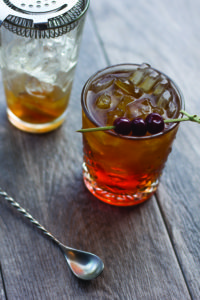
It’s impossible to pick a favorite from among this brief tour, as each distillery holds its own charms. Visit George Dickel for the history, Nelson’s Green Brier for the legacy, Chattanooga Whiskey for the science and Corsair for the cocktails. The story plus the flavor is what equals unique Tennessee whiskey brands every delicious time.
Chattanooga Whiskey Manhattan
~ 2 oz. Chattanooga Whiskey 1816 Reserve or Chattanooga Whiskey 1816 Cask
~ .75 oz. Dr. Thacher’s Manhattan Cocktail Syrup
~ FabbriItalianAmarenaWildCherries
Combine all ingredients in mixing glass, add ice, and stir. Strain into a martini glass (neat) or rocks glass (on ice) and serve with a cherry garnish.
All ingredients are available from the gift shop at Chattanooga Whiskey’s Experimental Distillery located at 1439 Market St. across from the Chattanooga Choo-Choo.
